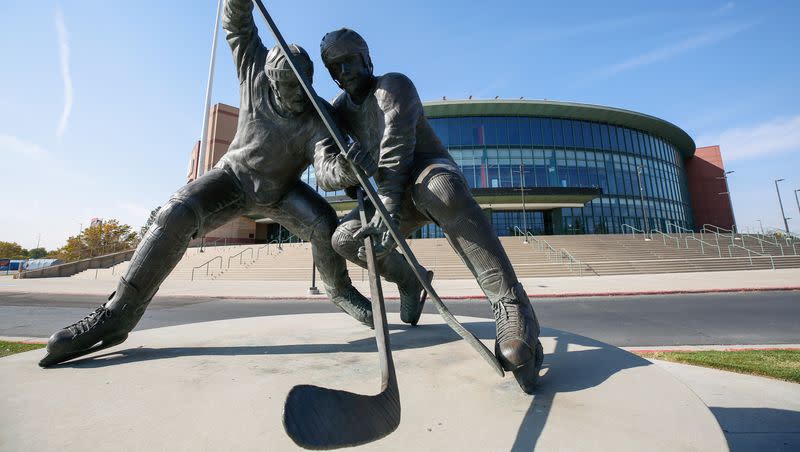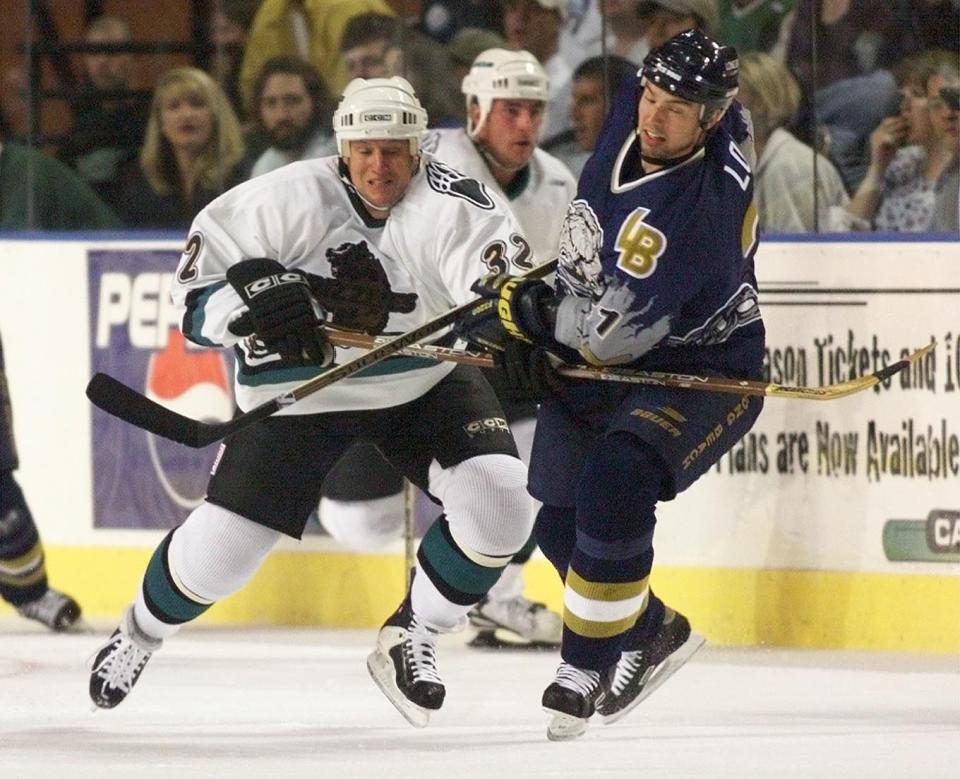Hitting the ice: Could Salt Lake score big with NHL hockey team?

Utah has a long tradition of professional hockey at the minor league level. But an NHL team in Salt Lake City would be a whole new sheet of ice.
Teams in the Beehive State, including the Salt Lake Golden Eagles and Utah Grizzlies, have at times excelled at the gate and in the rink over the years, even winning league championships along the way.
The Grizzlies, who play at the Maverik Center in West Valley City, are in the top third of the 28-team ECHL in attendance, averaging 5,334 fans per game last season, its highest in four years.
A successful NHL team would have to average at least three times that.
The Montreal Canadiens lead the league at 21,105, while the San Jose Sharks are at the bottom with 13,226 (Arizona Coyotes’ attendance is capped at 4,600 at their temporary 5,000-seat home at Arizona State University). The league average is more than 17,000 per game.
Fifteen of the NHL’s 32 teams were at 99% capacity or better for home games in the first two months of the current regular season, according to The Athletic, citing figures from Hockey Reference and HockeyDB. Ten more were at 91% or better.
On Wednesday, Smith Entertainment Group formally requested the NHL initiate the expansion process to bring a franchise to Utah. Ryan Smith, owner of the Utah Jazz, said SEG could accommodate a team at the Delta Center — configured to seat around 14,000 for hockey — as early as next year, with designs on building an arena dedicated to hockey in the future. The Delta Center has hosted NHL preseason games the past two years.
Related
According to SEG, the growth of the NHL’s business combined with the quality of the on-ice product have provided the league with great momentum. By virtually every metric, interest in the NHL has never been higher, reflected in national broadcast ratings on ESPN and TNT that are up by almost 30% over last season.
Also, Utah led the nation in growth during the 2010s. The combined statistical area of Salt Lake City, Provo and Ogden has an estimated population of nearly 2.8 million people, according to the Census Bureau. The Kem C. Gardner Policy Institute at the University of Utah estimates that the state’s population will grow to 5.5 million by 2060. By some measures, Utah has the best economy and fiscal stability in the country.
Given all that, could an NHL club thrive in the Beehive State?
Is Salt Lake a hockey town?
Eric Schulz, who worked with NBC and World Wrestling Entertainment in 2002 to launch the XFL football league and headed the Larry Miller Sports & Entertainment Group, said Salt Lake City could be a viable hockey market.
“But it would be tough sledding for a few years after their inaugural season and the newness wears off,” he said.
“Years two to five might be a bit of a struggle, especially if MLB comes to town and sucks up a lot of sponsorship dollars and ticket sales. NHL TV ratings have traditionally been low in Salt Lake City, so there isn’t as much awareness and interest as is the case with MLB.”
As Smith makes inroads with the NHL, the Larry H. Miller Company is doing the same with Major League Baseball as it pursues an expansion team for Salt Lake City.
On an interesting side note, Larry H. Miller owned a hockey team for a time. He bought the Salt Lake Golden Eagles in 1989 before selling them to an ownership group that moved the club to Detroit in 1994.

Schulz, now a senior lecturer in marketing in Utah State University’s Jon M. Huntsman School of Business, noted Utah has had minor league hockey for a long time at the Maverik Center, and attendance there is fairly limited to the same core group of fans.
“NHL prices would be more akin to Jazz pricing, and that would be a tough upsell for those fans and that demographic,” he said.
Andrew Zimbalist, an economist at Smith College in Massachusetts who has consulted in the sports industry for players’ associations, cities, companies, teams and leagues, told the Deseret News last year that NHL hockey would be more “thinkable” in Salt Lake City than Major League Baseball because a season has fewer games and an arena doesn’t have as many seats to fill.
“But the problem with hockey is that, both in Canada and the United States, the national television contracts aren’t very large so teams depend even more on local revenue,” he said. “It has more promise than a baseball team but I think it would still be a heavy lift.”
SEG’s sports broadcasting and direct-to-consumer streaming experience with its newly launched Jazz+ platform would likely be a valuable asset should the group add an NHL team to its portfolio.
Schulz said there is a finite group of companies sponsoring sports in Utah, and “I’m not sure they will pour more money into hockey. They may carve some dollars out of current sponsorships to move over, but probably won’t throw in more money. Most will take a wait-and-see approach, I think.”
The one advantage Smith’s group has is that it can bundle Jazz and NHL sponsorships to leverage the Jazz to get some NHL sponsor dollars, he said.
Market forecast
David Berri, a Southern Utah University economics professor who specializes in sports-related issues, noted of the 25 NHL teams located in the United States, six of them have smaller populations than the Salt Lake City-Provo-Orem area.
“That suggests that an NHL team in Salt Lake City would have every bit a chance to survive as a team in Buffalo, Nashville, Raleigh, Las Vegas, Columbus and Pittsburgh,” he said. “And given that we get more snow than three of those places, perhaps an NHL team would make even more sense in Salt Lake City.”
Beyond city size, Berri said he suspects “we will not truly know how much this population will support an NHL team until you put one here,” adding different cities have affinity for different sports. “I don’t think you can truly tell what will happen until you try.”
And the billionaire Smith is more than willing to open his wallet and try.
“We’re leaning all the way in,” he said Wednesday on “The Pat McAfee Show.” Smith said sports franchises can affect community change, and sports is the “greatest unifying platform of all time.”
“You start looking at what sports can do, it’s invigorating,” he said. “And so the idea to continue that with hockey and try to replicate what the Jazz have done for the community, you gotta go for it, even if it’s taking your life’s work and your life’s savings and putting it all towards that. What else are you going to do with it?”
Related
NHL and Olympics, too
Smith said the Delta Center could initially be the home for a hockey franchise but that SEG wants to build a hockey-specific arena for an NHL team and a future Olympics. It could also serve as an Olympic training venue, something he said the state lacks among its other winter sports facilities.
Fraser Bullock, chair of the Salt Lake City-Utah Committee for the Games, said with the Olympics all but certain to return to Utah, a state-of-the-art hockey arena would go a long way toward Utah’s ability to host a world-class Winter Games, including the women’s and men’s gold medal hockey games.
“And bringing professional hockey to Utah will further help cement Utah’s place as a premier destination for winter sports,” he said.
Related
SEG has not said whether a new arena would be in downtown Salt Lake City or in the suburbs, such as the new development at Point of the Mountain.
Schulz said it wouldn’t make sense to build a new hockey-only arena unless it was financed with Olympic money, but a downtown or Point of the Mountain location would work.
Berri said it’s worth noting that sports venues are not going to create economic growth.
“Research in this field makes that very clear. Sports teams can make us happier. Perhaps the best analogy is to think of building a park. Building a park in a neighborhood can make the neighborhood a nicer place to live. But it doesn’t create economic growth for the neighborhood. Adding a sports arena is very much like that,” he said.
Fan interest
Deseret News/Hinckley Institute of Politics polls last year showed fan interest in hockey appears to be substantially less than in baseball.
According to a May 2023 survey, 43% of Utahns say they would never go to an NHL hockey game, while 41% would attend less than five games a season. Another 10% say they would see five to 10 games.
Interestingly, 3% say they would go to more than 10 hockey games a year or buy season tickets — same as baseball, according to the poll.
Asked in a poll last September which sports franchise they would most support coming to Utah, residents ranked the NHL fourth behind the NFL, MLB and National Women’s Soccer League at 10%, a percentage point higher than the WNBA.
But much has changed in the past few months as both hockey and baseball have gained momentum in a state where local sports industry leaders and elected officials say Utah is primed to welcome the big leagues.
Related

